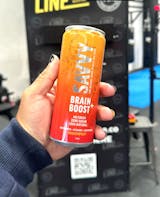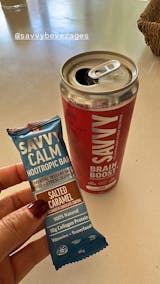Vitamin C (Ascorbic Acid)
Vitamin C is a natural essential vitamin that is one of the most popular micronutrients. It has many roles in the body and is linked to impressive health benefits. It has powerful antioxidant effects, and is able to decrease fatigue, improve mood, control stress, improve blood flow and also possesses neuroprotective effects.

Main health benefits for Savvy:
- Powerful antioxidant & anti inflammatory which helps cognitive function
- Essential for a healthy brain and learning capabilities
- Can help to control stress and anxiety
- Helps to reduce fatigue
- Enhances bioavailability of other nutrients in Savvy
- Improves healthy mood
To make it easy to identify all the different studies - we will highlight them for you!
We really hope you enjoy our many years of research when formulating Savvy...
Benefit 1
Powerful antioxidant and anti-inflammatory which helps prevent cognitive decline
Scientific Sources:
Harrison, F, ‘A critical review of Vitamin C for the prevention of age-related cognitive decline and Alzheimer’s disease’ in Journal of Alzheimer’s Disease, Volume 29, Issue 4, 2012, pp 711 -726 [Link]
“Antioxidants in the diet have long been thought to confer some level of protection against the oxidative damage that is involved in the pathology of Alzheimer’s disease as well as general cognitive decline in normal aging...Overall, there is a large body of evidence that maintaining healthy vitamin C levels can have a protective function against age-related cognitive decline and Alzheimer’s disease”
Ellulu, M, et al, ‘Effect of vitamin C on inflammation and metabolic markers in hypertensive and/or diabetic obese adults: a randomized controlled trial’ in Drug Design, Development and Therapy, Volume 9, July 2015, pp 3405 -3412 [Link]
“Vitamin C (500 mg twice daily) has potential effects in alleviating inflammatory status...”
Grant, MM, et al, ‘The presence of ascorbate induces expression of brain derived neurotrophic factor in SH-SY5Y neuroblastoma cells after peroxide insult, which is associated with increased survival.’ in Proteomics, Volume 5, Issue 2, February 2005, pp 534 - 540 [Link]
“Oxidative stress and free radical production have been implicated in Alzheimer's disease, where low levels of the antioxidant vitamin C (ascorbate) have been shown to be associated with the disease.”
Bendich, A, et al ‘The antioxidant role of vitamin C’ in Advances in Free Radical Biology and Medicine, Volume 2, Issue 2, 1986, pp 419 - 444 [Link]
“This review presents evidence which supports the importance of vitamin C as a component of the overall antioxidant protective mechanisms found in cells and tissues. The data are consistent and form a strong consensus for investigating the importance of the antioxidant function of vitamin C in the maintenance of human health.”
A, Seregi, et al, ‘Protective role of brain ascorbic acid content against lipid peroxidation.’ in Experientia, Volume 34, Issue 8, August 1978, pp 1056 -1057 [Link]
“The high ascorbic acid concentration in the brain inhibits lipid peroxidation induced by various agents in rat brain microsomes. The physiological importance of the fact is discussed.”
Qiu, S, et al, ‘Ascorbate transport by primary cultured neurons and its role in neuronal function and protection against excitotoxicity.’ in Journal of neuroscience research, Volume 85, Issue 5, April 2007, pp 1046 - 1056 [Link]
“Our results revealed that maintenance of intracellular ascorbate as a result of SVCT2 activity is crucial for neuronal development, functional maturation, and antioxidant responses.”
Benefit 2
Essential for a healthy brain and learning capability
Scientific Sources:
Bourre, JM, ‘Effects of nutrients (in food) on the structure and function of the nervous system: update on dietary requirements for brain. Part 1: micronutrients.’ The journal of nutrition, health and aging, Volume 10, Issue 5, September-October 2006, pp 377 - 385 [Link]
“In the brain, the nerve endings contain the highest concentrations of vitamin C in the human body”
A, Seregi, et al, ‘Protective role of brain ascorbic acid content against lipid peroxidation.’ in Experientia, Volume 34, Issue 8, August 1978, pp 1056 -1057 [Link]
“The high ascorbic acid concentration in the brain inhibits lipid peroxidation induced by various agents in rat brain microsomes. The physiological importance of the fact is discussed.”
Lee Jy, et al, ‘Ascorbate-induced differentiation of embryonic cortical precursors into neurons and astrocytes.’ in Journal of neuroscience research, Volume 73, Issue 2, July 2003, pp 156 - 165 [Link]
“These data suggest that AA [Ascorbate/Vitamin C] may act in the developing brain to stimulate the generation of CNS neurons and glia, thereby assisting in the formation of neural circuits by promoting the acquisition of neuronal synaptic functions.”
The above study relates to increases of myelin formation.
Hansen, S, et al, ‘Does Vitamin C Deficiency Affect Cognitive Development and Function?’ in Nutrients, Volume 6, Issue 9, September 2014, pp 3818 - 3846 [Link]
“Vitamin C is a pivotal antioxidant in the brain and has been reported to have numerous functions, including reactive oxygen species scavenging, neuromodulation, and involvement in angiogenesis [development of new blood vessels]...Collectively, controlled experimental animal studies support VitC as a key factor in the prevention of cognitive decline following both aging associated alteration as well as neurodegenerative disorders. Data also supports a direct effect of VitC deficiency on brain function particularly during development and/or regeneration”
de Oliveira, et al. ‘Effects of ascorbic acid combined to environmental enrichment on anxiety and memory.’ 1. Psychology & Neuroscience. Volume 12. Issue 3. 2019. pp. 363. [Link]
The study investigated the influence of Ascorbic acid on 13-month old rats on memory and anxiety. The results found that Ascorbic acid administration reduced anxiety-like behaviour and improved spatial memory, compared to control rats.
Mhaidat, Nizar M. et al. ‘Exploring the effect of vitamin C on sleep deprivation induced memory impairment.’ Brain Research Bulletin. Volume 113. 2015. pp. 41-47 [Link]
This research study was conducted to find the possible beneficial effects of vitamin C against sleep deprivation-induced memory impairment. Vitamin C was administered to rats at doses of 150 and 500 mg/kg/day. After 6 weeks, it was found that vitamin C normalised sleep deprivation and reduced effects on memory impairment.
Nawi, Afifah et al. ‘Impact of REM sleep deprivation on Endothelial function in rat model: role of vitamin C supplementation.’ Journal of Sustainability Science and Management. Volume 15. Issue 8. 2020. pp. 22-33. [Link]
This research study was conducted to evaluate the effect of rapid eye movement (REM) sleep deprivation on vitamin C. Rats were deprived of REM sleep, after which vitamin C was administered daily for 4 weeks at a dose of 100 mg/kg/day. It was found that vitamin C preserved the endothelial function, restored the protein expression and increased superoxide dimutase activity, thereby improving REM sleep deprivation.
Otocka-Kmiecik, Aneta, and Aleksandra Król. ‘The Role of Vitamin C in Two Distinct Physiological States: Physical Activity and Sleep.’ Nutrients. Volume 12. Issue 12. 2020. pp. 3908. [Link]
This review literature investigated to find the relationship between vitamin C and two physiological states, sleep and physical activity. It was found that vitamin C supplementation increased sleep duration, reduced sleep disturbances, relieved movement disorders, and decreased the dangerous effects of sleep apnea.
Rizk, Nermin I et al. ‘Attenuation of sleep deprivation dependent deterioration in male fertility parameters by vitamin C.’ Reproductive Biology and Endocrinology. Volume 18. Issue 1. 2020. pp. 1-13 [Link]
“Treatment with vitamin C enhanced both testicular structure and function in sleep deprived rats.”
Ikonte, Chioma J. et al. ‘Micronutrient inadequacy in short sleep: Analysis of the NHANES 2005–2016.’ Nutrients. Volume 11. Issue 10. 2019. pp. 2335 [Link]
“In females, there was an association between short sleep and a higher prevalence of inadequate intake for vitamin C...”
Nam, Sung Min et al. ‘Ascorbic acid mitigates D-galactose-induced brain aging by increasing hippocampal neurogenesis and improving memory function.’ Nutrients. Volume 11. Issue 1. 2019. pp. 176. [Link]
In the study, mice were subcutaneously administered with D-gal for 10 weeks; from the seventh week, ascorbic acid was orally co-administered for four weeks. It was found that Ascorbic acid mediated hippocampal restoration from D-gal-induced impairment and it was also associated with an enhanced hippocampus-dependent memory function.
Kurihara, Kazuki et al. ‘Ascorbic acid insufficiency impairs spatial memory formation in juvenile AKR1A-knockout mice.’ Journal of clinical biochemistry and nutrition. Volume 65. Issue 3. 2019. pp. 209-216 [Link]
“Mice requires more Ascorbic acid for the appropriate level of formation of spatial memory and that maturation of the neural system renders the memory forming process less sensitive to an Ascorbic acid insufficiency.”
Delrobaei, Fatemeh et al. ‘Ascorbic acid attenuates cognitive impairment and brain oxidative stress in ovariectomized mice.’ Pharmacological Reports. Volume 71. Issue 1. 2019. pp. 133-138 [Link]
“Ascorbic acid prevented from the deleterious effects of ovariectomy on learning memory (300 and 500 mg/kg) and working memory (100 and 500 mg/kg).”
Benefit 3
Can help control stress and anxiety
Scientific Sources:
Brody, S, et al, ‘A randomized controlled trial of high dose ascorbic acid for reduction of blood pressure, cortisol, and subjective responses to psychological stress.’ in Psychopharmacology (Berl), Volume 159, Issue 3, January 2002, pp 319-324. [Link]
“Compared to the placebo group, the ascorbic acid group had less systolic blood pressure (an increase of 23 versus 31 mmHg), diastolic blood pressure, and subjective stress responses to the TSST; and also had faster salivary cortisol recovery”
Mazloom, Z, et al, ‘Efficacy of supplementary vitamins C and E on anxiety, depression and stress in type 2 diabetic patients: a randomized, single-blind, placebo-controlled trial.’ in Pakistan journal of biological sciences, Volume 16, Issue 22, November 2013, pp 1597 - 1600 [Link]
“The results showed a significant decrease in anxiety level (p = 0.005) in vitamin C group compared to other groups...this study suggests that short-term supplementation of vitamin C is safe and beneficial for reducing anxiety levels in diabetic patients through alleviating oxidative damage.”
De Oliveira, IJ, et al, ‘Effects of Oral Vitamin C Supplementation on Anxiety in Students: A Double-Blind, Randomized, Placebo-Controlled Trial.’ in Pakistan journal of biological sciences, Volume 18, Issue 1, 2015, pp 11 - 18 [Link]
“Present study results not only provide evidence that vitamin C plays an important therapeutic role for anxiety but also point a possible use for antioxidants in the prevention or reduction of anxiety. This suggests that a diet rich in vitamin C may be an effective adjunct to medical and psychological treatment of anxiety and improve academic performance.”
Benefit 4
Helps to reduce fatigue
Scientific Sources:
Sang-Yeon, S, et al, ‘Intravenous Vitamin C administration reduces fatigue in office workers: a double-blind randomized controlled trial’ in Nutrition Journal, Volume 11, Issue 7, 2012 [Link]
“Thus, intravenous vitamin C reduced fatigue at two hours, and the effect persisted for one day. There were no significant differences in adverse events between two groups. High dose intravenous vitamin C proved to be safe and effective against fatigue in this study.”
Richardson, JH and Allen, RB. ‘Dietary supplementation with vitamin C delays the onset of fatigue in isolated striated muscle of rats.’ in Canadian journal of applied sport sciences, Volume 8, Issue 3, 1983, pp 140- 142 [Link]
“Results indicate that the supplementation of vitamin C prolongs contraction time by 19% thus delaying fatigue”
Huck, CJ, et al. ‘Vitamin C status and perception of effort during exercise in obese adults adhering to a calorie-reduced diet.’ in Nutrition (Burbank, LA, Cali), Volume 29, Issue 1, January 2013, pp 42 - 45 [Link]
“These data provide preliminary evidence that vitamin C status may influence fatigue, heart rate, and perceptions of exertion”
Benefit 5
Vitamin C helps to enhance bioavailability of other nutrients
Scientific Sources:
Carr, A and Vissers, M. ‘Synthetic or Food-Derived Vitamin C—Are They Equally Bioavailable?’ in Nutrients, Volume 5, Issue 11, November 2013, pp 4284 -4304 [Link]
“Vitamin C is known to enhance the bioavailability of other nutrients...which may enhance the health effects of vitamin C-containing foods. Bioflavonoids are also known to have numerous biological activities. Recently vitamin C has been shown to modulate specific biological activities of quercetin and tea polyphenols”
Moritz, Bettina, et al. ‘The role of vitamin C in stress-related disorders.’ The Journal of Nutritional Biochemistry. 2020. pp. 108459 [Link]
This literature review focused on the ability of Vitamin C to manage stress-related disorders. It was found that Ascorbic acid supplementation was effective in alleviating behavioural impairments associated with stress through a mechanism that counteracts the increase in stress hormones. The review also highlighted the deficiency of vitamin C that resulted in Scurvy and the associated anxiety.
Walia, Vaibha et al. ‘Nitrergic signaling modulation by ascorbic acid treatment is responsible for anxiolysis in mouse model of anxiety.’ Behavioural brain research. Volume 364. 2019. pp. 85-98 [Link]
The study investigated the effect of Ascorbic acid treatment on anxiety related behavioural and neurochemical alterations. Doses of 50, 100 and 200 mg/kg were administered to the mice, and the results revealed that 100 mg/kg significantly reduced the anxiety related behaviour and nitrite levels in the brain of mice.
Jamzadfard, Maryam, and Hamidreza Ebrahimi. ‘Improvement of the anxiety and depression during using Camaneur herbal distilate: comperhensive survey of the antioxidant effects.’ In 3rd international conference on agricultural sciences, medicinal plants and traditional medicine (Accepted). 2020.
“Vitamin C is an antioxidant involved in anxiety, memory, fatigue and mood state studies”
de Oliveira, et al. ‘Effects of ascorbic acid combined to environmental enrichment on anxiety and memory.’ Psychology & Neuroscience. Volume 12. Issue 3. 2019. pp. 363. [Link]
“Ascorbic acid reduced anxiety-like behaviour…”
Benefit 6
Helps Improve Healthy Mood
Scientific Sources:
Kennedy, David O. et al. ‘Effects of high-dose B vitamin complex with vitamin C and minerals on subjective mood and performance in healthy males’ in Journal of psychopharmacology. Volume 211, Issue 1, July 2010, pp 55-68. [Link]
“Healthy members of the general population may benefit from augmented levels of vitamins/minerals via direct dietary supplementation. Specifically, supplementation led to improved ratings of stress, mental health and vigour and improved cognitive performance during intense mental processing.”
Harrison, F, ‘A critical review of Vitamin C for the prevention of age-related cognitive decline and Alzheimer’s disease’ in Journal of Alzheimer’s Disease, Volume 29, Issue 4, 2012, pp 711 -726 [Link]
“Long-term vitamin C deprivation, evidenced by low plasma levels in men with normal diets, was linked to nervousness, depression and emotional lability. In the literature there is overwhelming evidence that a lifetime of good nutrition, thus avoiding sub-clinical deficiency in vitamin C and other antioxidants, is necessary to restrict the accumulation of damage, particularly in cases of disease.”
Brody, S, ‘High-dose ascorbic acid increases intercourse frequency and improves mood: a randomized controlled clinical trial.’ in Biological psychiatry, Volume 52, Issue 4, August 2002, pp 371 - 374 [Link]
“Ascorbic acid (AA) modulates catecholaminergic activity, decreases stress reactivity, approach anxiety and prolactin release, improves vascular function, and increases oxytocin release. These processes are relevant to sexual behavior and mood.”
Sahraian, A, et al, ‘Vitamin C as an adjuvant for treating major depressive disorder and suicidal behavior, a randomized placebo-controlled clinical trial’ in Biomed Central Trials, Volume 16, Issue 94, March 2015 [Link]
“The results of the effects of vitamin C on depression in healthy individuals and patients with some medical conditions are contradictory. A randomized double-blind, placebo-controlled 14-day trial of sustained-release ascorbic acid including 42 healthy young adults showed that vitamin C (3,000 mg/day) increased mood measured by the Beck Depression Scale. Vitamin C also decreased psychological subjective stress. In a randomized double-blind placebo-controlled trial including depressed shift workers, vitamin C (500 mg/day) significantly decreased depression severity.”
Khajehnasiri, F, et al, ‘Effect of omega-3 and ascorbic acid on inflammation markers in depressed shift workers in Shahid Tondgoyan Oil Refinery, Iran: a randomized double-blind placebo-controlled study.’ in Journal of clinical biochemistry and nutrition, Volume 53, Issue 1, July 2013, pp 36-40 [Link]
“This study showed that supplementation of omega-3 plus vitamin C is associated with a decrease in depression score”
Amr, M, et al, ‘Efficacy of vitamin C as an adjunct to fluoxetine therapy in pediatric major depressive disorder: a randomized, double-blind, placebo-controlled pilot study’ in Nutrition Journal, Volume 12, Issue 31, March 2013. [Link]
“Patients treated for six months with fluoxetine and vitamin C showed a significant decrease in depressive symptoms in comparison to the fluoxetine plus placebo group… These preliminary results suggest that vitamin C may be an effective adjuvant agent in the treatment of MDD in pediatric patients.”
Shivavedi, Naveen et al. ‘Ascorbic acid therapy: a potential strategy against comorbid depression-like behavior in streptozotocin-nicotinamide-induced diabetic rats.’ Biomedicine & Pharmacotherapy. Volume 109. 2019. pp. 351-359 [Link]
This research study examined the potency and efficiency of Ascorbic acid in the management of depression-like behaviour in diabetic rats. The effects were found to be dose dependent with maximum depression inhibition at 200mg/kg of Ascorbic acid.
Fraga, Daiane B. et al. ‘Ascorbic acid presents rapid behavioral and hippocampal synaptic plasticity effects.’ Progress in Neuro-Psychopharmacology and Biological Psychiatry. Volume 96. 2020. pp. 109757 [Link]
This research study evaluated the antidepressant effect of a single administration of ascorbic acid (1 mg/kg). It was found that behavioural and synaptic responses were altered by the administration of vitamin C through mechanisms like upregulation of synaptic proteins, dendritic spine density, and maturation in the ventral dentate gyrus. This implicated that Ascorbic acid has antidepressant/anxiolytic behaviour.
Moritz, Bettina, et al. ‘The role of vitamin C in stress-related disorders.’ The Journal of Nutritional Biochemistry. 2020. pp. 108459 [Link]
“Vitamin C depletion has been associated with increased depressive symptoms.”
Pullar, Juliet M. et al. ‘High vitamin C status is associated with elevated mood in male tertiary students.’ Antioxidants. Volume 7. Issue 7. 2018. pp. 91 [Link]
“...inverse associations of vitamin C status with depression...”
Moretti, Morgana, et al. ‘Evidence for the involvement of opioid system in the antidepressant-like effect of ascorbic acid.’ Naunyn-Schmiedeberg's archives of pharmacology. Volume 391. Issue 2. 2018. pp. 169-176 [Link]
“Ascorbic acid may exert a beneficial effect for the treatment of major depressive disorder.”
Jamzadfard, Maryam, and Hamidreza Ebrahimi. ‘Improvement of the anxiety and depression during using Camaneur herbal distilate: comperhensive survey of the antioxidant effects.’ In 3rd international conference on agricultural sciences, medicinal plants and traditional medicine (Accepted). 2020.
“Depression”
Pullar, Juliet M. et al. ‘High vitamin C status is associated with elevated mood in male tertiary students.’ Antioxidants. Volume 7. Issue 7. 2018. pp. 91 [Link]
The study aimed to investigate the association of vitamin C status with mood state in a sample of male tertiary students. The study conducted on 18-35 years aged male students measured the plasma C concentration and found that the vitamin status was inversely associated with total mood disturbances score, depression, confusion and anger.
Carr, Anitra C., and Sam Rowe. ‘Factors affecting vitamin C status and prevalence of deficiency: A global health perspective.’ Nutrients. Volume 12. Issue 7. 2020. pp. 1963. [Link]
“Even mild insufficiency or hypovitaminosis C can be associated with symptoms such as low mood.”
Amrein, Karin et al. ‘Vitamin therapy in critically ill patients: focus on thiamine, vitamin C, and vitamin D.’ Intensive care medicine. Volume 44. Issue 11. 2018. pp. 1940-1944. [Link]
“…improve ...mood”
HOW TO TAKE VITAMIN C
I am sure you can now see the amazing benefits of Vitamin C and why we use it in Savvy to make our products SO MUCH BETTER.
You can take Vitamin C by itself as it naturally occurs in many fruits and vegetables. If you want to ensure you are getting a good dose of vitamin C most health practitioners and nutritionists recommend supplementing with it.
And while you might experience benefits from Vitamin C by itself, the synergistic approach offers even more benefits when you take several vitamins and nootropics together. but we have made it easy for you and that is why our products contain vitamins, nootropics and herbs that work as an amazing team such as B vitamins, Ashwagandha, Panax Ginseng and Rhodiola Rosea.












